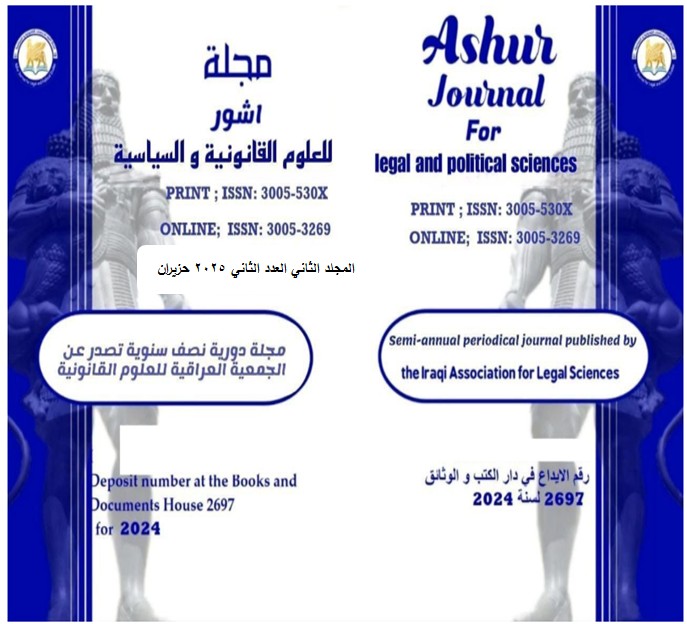The Impact of the Geopolitical Dimension on Achieving Strategic Equilibriums
DOI:
https://doi.org/10.64184/ajlps.V2.I2.Y2025.P1-41.42Keywords:
Geopolitics, Strategic Balance, Political Geography, International System, Geopolitical SecurityAbstract
Geopolitics represents a fundamental pillar in explaining international interactions and shaping strategic balances among states, particularly amid growing geographical conflicts and competition over vital routes. The importance of this study lies in clarifying how political geography functions as a tool of power and influence in a multipolar world. It is hypothesized that an active geopolitical position enhances a state's ability to achieve regional and international strategic balance. The central research problem revolves around the nature of this influence and whether it remains constant or varies according to geopolitical contexts. Descriptive, analytical, and comparative methodologies were applied. The findings confirm that geography remains a stable law in international politics, reinforcing the hypothesis and highlighting the central role of geographical factors in determining the destinies of nations and shaping their realist strategies.
References
Arabic Sources.
First: The Holy Quran: Surat Al-Hijr.
Second: Dictionaries and Encyclopedias:
1. Ibrahim Mustafa and others, Al-Mu'jam Al-Wasit, Dar Al-Da'wa, Academy of the Arabic Language, Cairo, 2010.
2. Graham Evans and Geoffrey Newnham, Penguin Dictionary of International Relations, 1st ed., Gulf Research Center, Saudi Arabia, 2004.
Third: Arabic and Translated Books:
1. Alexander Dugin, Foundations of Geopolitics: Russia's Geopolitical Future, translated by Imad Hatem, United New Book House, Tripoli, 2004.
2. Khader Abbas Atwan, Global Powers and Regional Balances, 1st ed., Osama House, Jordan, 2010.
3. Robert Gilpin, War and Change in World Politics, translated by Omar Saad Al-Ayubi, Dar Al-Kitab Al-Arabi, Beirut, 2009.
4. Robert Kaplan, The Revenge of Geography: What Maps Tell Us About Future Conflicts and the War Against Destiny, translated by Ihab Abdul Rahim Ali, National Council for Culture, Arts, and Letters, Kuwait, 2015.
5. Richard Liddle, The Balance of Power in International Relations: Metaphors and Myths, translated by Hani Tabari, Dar Al-Kitab Al-Arabi, Beirut, 2000.
6. Zbigniew Brzezinski, The Grand Chessboard: American Primacy and Its Geostrategic Requirements, translated by Amal Al-Sharqi, Al-Ahliya Publishing and Distribution, Amman, 2007.
7. Diaa Abdul Mohsen Mohammed, Geopolitical Geography, 1st ed., Ghaidaa Publishing and Distribution House, Amman, 2016.
8. Firas Mohammed Ahmed Al-Juhaishi, New Strategic Balances in Light of a Changing Security Environment, 1st ed., Academics for Publishing and Distribution, Amman, 2015.
9. Mohammed Azhar Al-Samak, Political Geopolitics from a Twenty-First Century Perspective: Between Methodology and Application, 1st ed., Al-Yazouri Scientific House, Iraq, 2011.
10. Mohammed Jawdat Amer, The Distribution of Power and the Future of the Global Balance, unpublished doctoral dissertation, College of Political Science, Al-Nahrain University, Baghdad, 2018.
11. Mohammed Riyad, General Principles of Political Geography and Geopolitics, Hindawi Foundation for Education and Culture, Cairo 2014.
12. Muhammad Riyad, General Principles of Political Geography and Geopolitics with an Applied Study on the Middle East, Hindawi Foundation for Education and Culture, Cairo, Egypt, 2014.
13. Ibrahim Abu Khazam, The Arabs and the Balance of Power in the Twenty-First Century, Tripoli International Library, Tripoli, 1997.
14. Abdul Qader Muhammad Fahmy, Introduction to the Study of Strategy, Majdalawi Publishing and Distribution House, Amman, Jordan, 2006.
15. Abdul Qader Muhammad Fahmy, Introduction to the Study of Strategy, Majdalawi Publishing and Distribution House, Amman, 2006, Academics for Publishing and Distribution, Amman, 2015.
Fourth: Periodicals (Research and Studies):
1. Jalal Khashab, Geopolitics in the Twenty-First Century: The Triumph of Geography and the Return of Thucydides' World, Arab Journal of Political Science, Center, Issue 4, 2021, Center for Arab Unity Studies, Beirut, 2021.
2. Robert Istov, "Geopolitics and Russian Geopolitics: The Space Phenomenon," European Journal, Issue (1), of Political Geography, 2013.
3. Ali Al-Din Hilal, "The Search for a New Strategic Balance," Al-Risala Magazine, Arab Strategic Center, Damascus, Issue 3, 1997.
4. Muhammad Tay, "Geopolitics from the Mid-Nineteenth Century to the Present," 1st ed., Advisory Center for Studies and Documentation, Issue 19, Lebanon, 2019.
5. Muhammad Mujahid Al-Zayat, "Strategic Balance in the Gulf Region: Variables and Solutions," Opinions on the Gulf Magazine, Issue (116), 2017.
6. Munim Sahi Al-Ammar, "Strategic Balance and the Differential Power Thesis," Lectures delivered to doctoral students, Department of Strategy, College of Political Science, Al-Nahrain University, 2021.
7. Munim Sahi Al-Ammar, "Arab Balances of Weakness," Center for International Studies, Baghdad, 2002.
8. Yamitri Shlapintokh, "Dugin Erasmus: A Window into the Minds of the Russian Elite or an Intellectual Trick?", Studies in East European Thought, Vol. 59, No. (3), Russia, 2007.
9. Daniel Bethlehem, "The End of Geography: The Changing Nature of the International Order and the Challenge of International Law," European Journal of International Law, Vol. 25, No. (1), 2014.
Fifth: Theses and Dissertations:
1. Lubna Khamis Mahdi, "The Strategic Balance in the Middle East after the Events of September 11, 2001," unpublished doctoral dissertation, College of Political Science, Al-Nahrain University, Baghdad, 2005.
2. Marwan Salem Ali Al-Ali, "The New Regionalism and the International Order: A Study of the Problem of Influence and Influence," unpublished master's thesis, College of Political Science, Al-Nahrain University, Baghdad, 2014.
3. Nabaa Ihsan Sharif Hassan, The Impact of Strategic Depth on International Balances after 2003 AD "The Middle East as a Model", Unpublished Master's Thesis, Nahrain University, College of Political Science, Department of Strategy, Baghdad, 2020.
Sixth / The International Information Network (Internet):
1. Sanaa Nasrati, The Concept of Geo-Economics, Al-Hewar Al-Mutamadin, Issue (3807), 2012, a research paper available on the International Information Network (Internet) at the link: -
Downloads
Published
Issue
Section
License
The authors retain Full copyright of their published article
Ashur Journal of Legal and Political Sciences applies the Creative Commons Attribution 4.0 International (CC BY 4.0) License to articles and other works we publish. If you submit your paper for publication by AJLPS, you agree to have the CC BY 4.0 license applied to your work.
Articles can be read and shared for under the following conditions:
BY: Attribution must be given to the original source (Attribution)
Full details available at
https://creativecommons.org/licenses/by/4.0/






